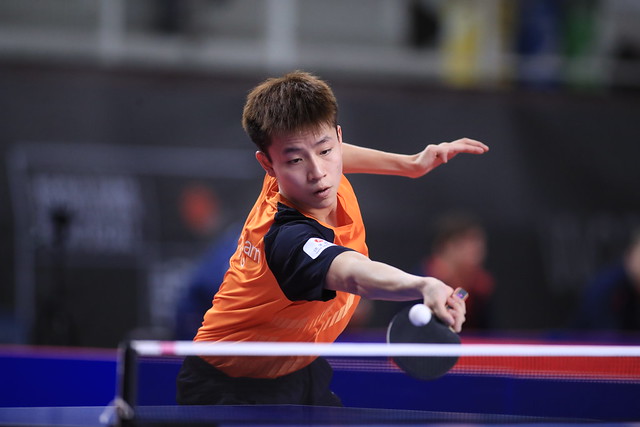by Ian Marshall, Editor
Against Belarus, Maria Xiao beat Nadezhda Bogdanova (9-11, 11-8, 11-8, 11-3) in the second match of the fixture, after colleagues Galia Dvorak and Zhang Sofia-Xuan had experienced doubles defeat at the hands of Katsiaryna Baravok and Daria Trigolos (5-11, 13-11, 11-6, 11-9).
Galia Dvorak gave Spain the advantage by overcoming Katsiaryna Baravok (11-9, 11-9, 11-4) in the third match of the fixture, before Nadezhda Bogdanova levelled matters by overcoming Zhang Sofia-Xuan.
Thus the scene was set to determine the outcome, Maria Xiao faced a spirited Daria Trigolos; a young lady who tested the Spaniard by recovering from a two games to nil deficit to force a decider. Sadly the contest finished with Maria Xiao gaining the verdict, an unreturnable edge ball (11-7, 11-7, 4-11, 5-11, 11-8).
Did simple things well
However, in no way whatsoever should the conclusion detract from the efforts of Maria Xiao.
Above all else she did the simple things well; she put the ball on the table, time and again a controlled forehand top spin was the opening stroke, not fast but safe with heavy rotation, forcing her opponent into a passive role. Equally, left handed, from the backhand, she was safe, creating angles, making Daria Trigolos move; playing consistently controlling matters.
“The key was to not give up, I lost the third and fourth games really easy. After I just focused on the first ball, service and receive.” Maria Xiao
Maria Xiao
Success against Belarus meant she maintained her unbeaten record. In a 3-0 win against Great Britain she had beaten Tin-Tin Ho (11-9, 11-3, 11-8); in the 3-1 defeat when facing Austria, she had overcome Sofia Polcanova (11-3, 6-11, 5-11, 11-5, 11-4).
Fighting herself
Compact technical skills proved a factor but composure was the vital ingredient, especially after losing the third and fourth games against Daria Trigolos. However, if any player needed to be strong mentally on the morning of the fourth day of play, it was Maria Migot.

Not only did the 21 year old have to fight against her opponent, she had to fight against herself. India fielded Manika Batra, Ayhika Mukherjee and Sutirtha Mukherjee, the team that the previous day had come so close against Romania. All three use combination rackets, long pimpled rubber on the backhand, antispin or smooth reversed on the forehand.
After India had taken the lead by securing the doubles, Ayhikha Mukherjee and Suturtha Mukherjee beating Stéphanie Loeuillette and Yuan Jia Nan (11-7, 6-11, 10-12, 11-4, 11-8), the pressure was firmly on the shoulders of Marie Migot as she faced Manika Batra, the 2008 Commonwealth Games gold medallist. Focused Marie Migot prevailed in five games (11-7, 3-11, 11-9, 3-11, 11-7) to level matters.
Yuan Jia Nan returned to the fray to beat Sutirtha Mukherjee (11-7, 11-8, 11-6), before Stéphanie Loeuillette experienced defeat at the hands of Manika Batra (11-7, 12-10, 11-4).
Vital deciding match
Proceedings level, Marie Migot faced Ayhika Mukherjee; it was in that contest where she had to fight herself.
She wanted to play at speed, counter top spin; against the combination racket of her adversary, patience was needed. The contest went the full distance; at the change of ends in the fifth game Marie Migot trailed by one point, she lost the next but then recovered to lead 9-7. The next point was lost but playing carefully, remaining calm she established a 10-8 lead, she converted at the second attempt (6-11, 11-8, 9-11, 11-9, 11-9).
“I was up on the last game, but it was a special game. She had this anti-spin and pimples. I have never played this kind of game before. I was nervous because of the game also but I tried, and in the end was good. I fought a lot, I worked hard and I’m super happy to have given the last point to France. Portugal are at home. We are still the outsiders , so we try to push them an maybe win this match, we will see at 7.00 pm this evening.” Marie Migot
At the semi-final stage in the battle for the one remaining place in the women’s team event France meets Portugal, Spain confronts Korea Republic.


